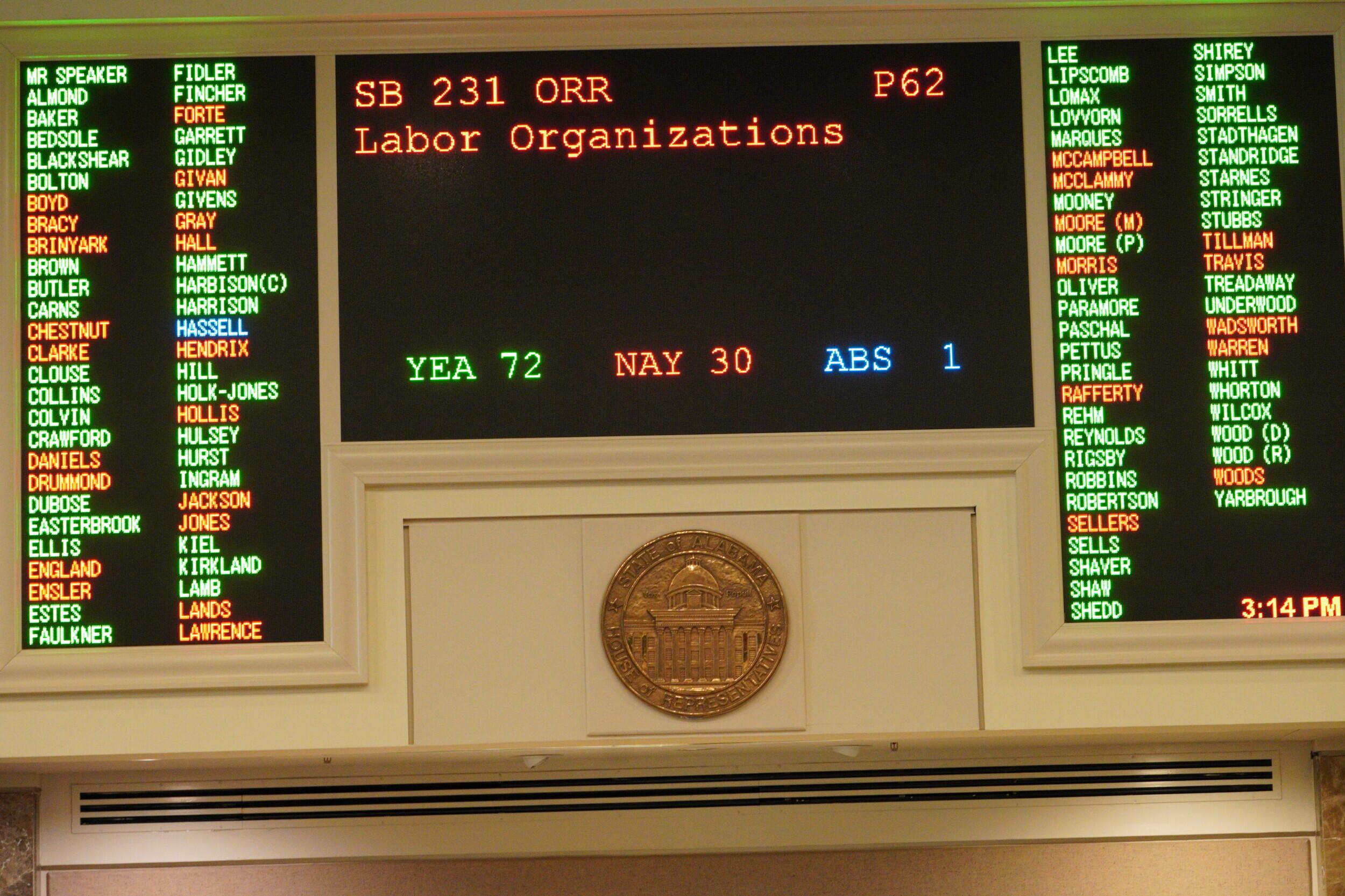MONTGOMERY — Senate legislation that would claw back economic incentives from employers that recognize a labor union selected without using secret ballots passed the House of Representatives on Tuesday.
Senate Bill 231 (SB231), sponsored by State Sen. Arthur Orr (R-Decatur), states that no employer would be eligible to receive an economic development incentive for a project if the employer voluntarily grants recognition rights for the employees solely and exclusively based on signed labor organization authorization cards if the selection of a bargaining representative may be conducted through a secret ballot election.
Economic incentives apply to any grant, loan, or tax credit the state or local government provides to an employer.
Under the bill, an employer who voluntarily discloses an employee's personal contact information to a labor organization or third party acting on behalf of a labor organization without the employee's prior written consent, unless otherwise required by state or federal law, would also be ineligible for economic development incentives.
The bill does not apply to any agreement between the state and an employer executed before Jan. 1, 2025.
House Majority Leader Scott Stadthagen (R-Hartselle) presented the bill before the House. Stadthagen said that the legislation only requires employers that receive incentives to conduct any ballot measure with a secret ballot. He also stated the bill's purpose is to prevent workers from being intimidated into voting in favor of unionization.
"This pertains to any business that receives incentives; it doesn't specify who receives it. If you do receive it, you have to let your employees vote on a private ballot," Stadthagen said.
"These companies can actually be unionized. It's not kicking the unions out. It's giving that employee the opportunity to vote, if it's a Union, on a private ballot," he continued.
Several Republican lawmakers supported the bill.
"This bill adds to the security of the ballot process," said State Rep. Arnold Mooney (R-Indian Hills). "The secret ballot removes pressure from the unions and so forth in relation to the foundational liberties and principles when our nation was built. [Orr's] bill is very strong in creating economic development incentives for our state. Thank you for carrying it."
Democratic House members opposed the legislation, speaking often in favor of labor unions in general.
State Rep. Napoleon Bracy (D-Prichard) questioned the bill's motivation and asked Stadthagen's opinion on unions in general.
"I think it's important for the citizens of Alabama, employees to voice their opinion in private," Stadthagen replied. "Just like when we do elections."
He continued, "My thoughts on Unions: it depends on the union itself. We've had some unions that have been a part of our state for a very long time, and they've worked very well."
State Rep. Laura Hall (D-Huntsville) also questioned the bill's timing, pointing to recent union efforts amongst some scheduled automotive union votes coming soon.
United Auto Workers (UAW) recently announced an ongoing unionization push by workers at a Hyundai plant in Montgomery and a Mercedes-Benz plant in Vance. Under existing law, an employer may recognize a labor union if a majority of employees sign cards pledging to join the union.
'Recently, we've had statements made about unions forming at Mercedes and Hyundai, and some sort of agreement is supposed to take place by May," Hall said. "It looks like we're trying to get in front of that train."
"So, with those two examples that you just gave me, all this [bill] would mean is, if the unions came into Mercedes or Hyundai, then they would have to allow their employees to vote on a private ballot."
The bill was amended several times. One amendment required the Commerce Department to disclose any clawed-back incentives to the legislature. The bill was further amended to allow it to go into effect immediately after being signed by Gov. Kay Ivey.
The legislation ultimately passed 72-30 with one abstention. Since the House amended the bill, the Senate will have to concur with the changes before going to Ivey's desk.
House Speaker Nathaniel Ledbetter (R-Rainsville) applauded the bill's passage after the vote.
"Where I come from, you never ask someone how they voted in an election. If a vote to unionize is going to happen, votes should be private, and employees shouldn't have to weigh potential repercussions when making their decisions. I'm proud that the House voted to protect Alabamians from pressure and intimidation tactics like card-check, and I look forward to Governor Ivey signing this legislation into law."
To connect with the author of this story or to comment, email craig.monger@1819news.com.
Don't miss out! Subscribe to our newsletter and get our top stories every weekday morning.










